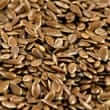Background
- Flaxseed and its derivative flaxseed oil/linseed oil are rich sources of the essential fatty acid alpha-linolenic acid, which is a biologic precursor to omega-3 fatty acids such as eicosapentaenoic acid. Although omega-3 fatty acids have been associated with improved cardiovascular outcomes, evidence from human trials is mixed regarding the efficacy of flaxseed products for coronary artery disease or hyperlipidemia.
- The lignan constituents of flaxseed (not flaxseed oil) possesses in vitro anti-oxidant and possible estrogen receptor agonist/antagonist properties, prompting theories of efficacy for the treatment of breast cancer. However, there is not sufficient human evidence to make a recommendation. As a source of fiber mucilage, oral flaxseed (not flaxseed oil) may possess laxative properties, although only one human trial has been conducted for this indication. In large doses, or when taken with inadequate water, flaxseed may precipitate bowel obstruction via a mass effect. The effects of flaxseed on blood glucose levels are not clear, although hyperglycemic effects have been reported in one case series.
- Flaxseed oil contains only the alpha-linolenic acid component of flaxseed, and not the fiber or lignan components. Therefore, flaxseed oil may share the purported lipid-lowering properties of flaxseed, but not the proposed laxative or anti-cancer abilities.
References
Natural Standard developed the above evidence-based information based on a thorough systematic review of the available scientific articles. For comprehensive information about alternative and complementary therapies on the professional level, go to . Selected references are listed below.
- Basch E, Bent S, Collins J, et al. Flax and flaxseed oil (Linum usitatissimum): a review by the Natural Standard Research Collaboration. J Soc Integr Oncol 2007 Summer;5(3):92-105.
View Abstract - Brooks JD, Ward WE, Lewis JE, et al. Supplementation with flaxseed alters estrogen metabolism in postmenopausal women to a greater extent than does supplementation with an equal amount of soy. Am J Clin Nutr 2004;79(2):318-325.
View Abstract - Dahl WJ, Lockert EA, Cammer AL, et al. Effects of flax fiber on laxation and glycemic response in healthy volunteers. J Med Food 2005 Winter;8(4):508-11.
View Abstract - Dodin S, Lemay A, Jacques H, et al. The effects of flaxseed dietary supplement on lipid profile, bone mineral density, and symptoms in menopausal women: a randomized, double-blind, wheat germ placebo-controlled clinical trial. J Clin Endocrinol Metab 2005;90(3):1390-1397.
View Abstract - Faintuch J, Horie LM, Barbeiro HV, et al. Systemic inflammation in morbidly obese subjects: response to oral supplementation with alpha-linolenic acid. Obes Surg 2007 Mar;17(3):341-7.
View Abstract - Goss PE, Li T, Theriault M, et al. Effects of dietary flaxseed in women with cyclical mastalgia. Breast Cancer Res Treat 2000;64:49.
- Hu FB, Stampfer MJ, Manson JE, et al. Dietary intake of alpha-linolenic acid and risk of fatal ischemic heart disease among women. Am J Clin Nutr 1999;69(5):890-897.
View Abstract - Joshi K, Lad S, Kale M, et al. Supplementation with flax oil and vitamin C improves the outcome of Attention Deficit Hyperactivity Disorder (ADHD). Prostaglandins Leukot Essent Fatty Acids 2006 Jan;74(1):17-21.
View Abstract - Lemay A, Dodin S, Kadri N, et al. Flaxseed dietary supplement versus hormone replacement therapy in hypercholesterolemic menopausal women. ObstetGynecol 2002;100(3):495-504.
View Abstract - Lewis JE, Nickell LA, Thompson LU, et al. A randomized controlled trial of the effect of dietary soy and flaxseed muffins on quality of life and hot flashes during menopause. Menopause 2006 Jul-Aug;13(4):631-42.
View Abstract - Mandasescu S, Mocanu V, Dascalita AM, et al. Flaxseed supplementation in hyperlipidemic patients. Rev Med Chir Soc Med Nat Iasi. 2005 Jul-Sep;109(3):502-6.
View Abstract - Oomen CM, Ocke MC, Feskens EJ, et al. Alpha-Linolenic acid intake is not beneficially associated with 10-y risk of coronary artery disease incidence: the Zutphen Elderly Study. Am J Clin Nutr 2001;74(4):457-463.
View Abstract - Stoll AL, Severus WE, Freeman MP, et al. Omega 3 fatty acids in bipolar disorder: a preliminary double-blind, placebo-controlled trial. Arch Gen.Psychiatry 1999;56(5):407-412.
View Abstract - von Schacky C, Angerer P, Kothny W, et al. The effect of dietary omega-3 fatty acids on coronary atherosclerosis. A randomized, double-blind, placebo-controlled trial. Ann Intern Med 4-6-1999;130(7):554-562.
View Abstract - Young GS, Conquer JA, Thomas R. Effect of randomized supplementation with high dose olive, flax or fish oil on serum phospholipid fatty acid levels in adults with attention deficit hyperactivity disorder. Reprod Nutr Dev 2005 Sep-Oct;45(5):549-58.
View Abstract







